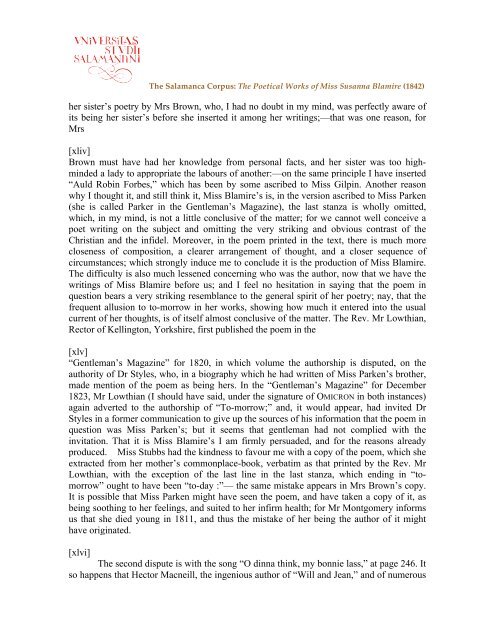The Poetical Works of Miss Susanna Blamire (1842) - Gredos ...
The Poetical Works of Miss Susanna Blamire (1842) - Gredos ...
The Poetical Works of Miss Susanna Blamire (1842) - Gredos ...
You also want an ePaper? Increase the reach of your titles
YUMPU automatically turns print PDFs into web optimized ePapers that Google loves.
<strong>The</strong> Salamanca Corpus: <strong>The</strong> <strong>Poetical</strong> <strong>Works</strong> <strong>of</strong> <strong>Miss</strong> <strong>Susanna</strong> <strong>Blamire</strong> (<strong>1842</strong>)<br />
her sister’s poetry by Mrs Brown, who, I had no doubt in my mind, was perfectly aware <strong>of</strong><br />
its being her sister’s before she inserted it among her writings;—that was one reason, for<br />
Mrs<br />
[xliv]<br />
Brown must have had her knowledge from personal facts, and her sister was too highminded<br />
a lady to appropriate the labours <strong>of</strong> another:—on the same principle I have inserted<br />
“Auld Robin Forbes,” which has been by some ascribed to <strong>Miss</strong> Gilpin. Another reason<br />
why I thought it, and still think it, <strong>Miss</strong> <strong>Blamire</strong>’s is, in the version ascribed to <strong>Miss</strong> Parken<br />
(she is called Parker in the Gentleman’s Magazine), the last stanza is wholly omitted,<br />
which, in my mind, is not a little conclusive <strong>of</strong> the matter; for we cannot well conceive a<br />
poet writing on the subject and omitting the very striking and obvious contrast <strong>of</strong> the<br />
Christian and the infidel. Moreover, in the poem printed in the text, there is much more<br />
closeness <strong>of</strong> composition, a clearer arrangement <strong>of</strong> thought, and a closer sequence <strong>of</strong><br />
circumstances; which strongly induce me to conclude it is the production <strong>of</strong> <strong>Miss</strong> <strong>Blamire</strong>.<br />
<strong>The</strong> difficulty is also much lessened concerning who was the author, now that we have the<br />
writings <strong>of</strong> <strong>Miss</strong> <strong>Blamire</strong> before us; and I feel no hesitation in saying that the poem in<br />
question bears a very striking resemblance to the general spirit <strong>of</strong> her poetry; nay, that the<br />
frequent allusion to to-morrow in her works, showing how much it entered into the usual<br />
current <strong>of</strong> her thoughts, is <strong>of</strong> itself almost conclusive <strong>of</strong> the matter. <strong>The</strong> Rev. Mr Lowthian,<br />
Rector <strong>of</strong> Kellington, Yorkshire, first published the poem in the<br />
[xlv]<br />
“Gentleman’s Magazine” for 1820, in which volume the authorship is disputed, on the<br />
authority <strong>of</strong> Dr Styles, who, in a biography which he had written <strong>of</strong> <strong>Miss</strong> Parken’s brother,<br />
made mention <strong>of</strong> the poem as being hers. In the “Gentleman’s Magazine” for December<br />
1823, Mr Lowthian (I should have said, under the signature <strong>of</strong> OMICRON in both instances)<br />
again adverted to the authorship <strong>of</strong> “To-morrow;” and, it would appear, had invited Dr<br />
Styles in a former communication to give up the sources <strong>of</strong> his information that the poem in<br />
question was <strong>Miss</strong> Parken’s; but it seems that gentleman had not complied with the<br />
invitation. That it is <strong>Miss</strong> <strong>Blamire</strong>’s I am firmly persuaded, and for the reasons already<br />
produced. <strong>Miss</strong> Stubbs had the kindness to favour me with a copy <strong>of</strong> the poem, which she<br />
extracted from her mother’s commonplace-book, verbatim as that printed by the Rev. Mr<br />
Lowthian, with the exception <strong>of</strong> the last line in the last stanza, which ending in “tomorrow”<br />
ought to have been “to-day :”— the same mistake appears in Mrs Brown’s copy.<br />
It is possible that <strong>Miss</strong> Parken might have seen the poem, and have taken a copy <strong>of</strong> it, as<br />
being soothing to her feelings, and suited to her infirm health; for Mr Montgomery informs<br />
us that she died young in 1811, and thus the mistake <strong>of</strong> her being the author <strong>of</strong> it might<br />
have originated.<br />
[xlvi]<br />
<strong>The</strong> second dispute is with the song “O dinna think, my bonnie lass,” at page 246. It<br />
so happens that Hector Macneill, the ingenious author <strong>of</strong> “Will and Jean,” and <strong>of</strong> numerous
















